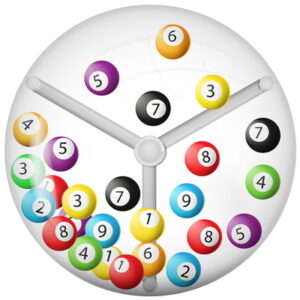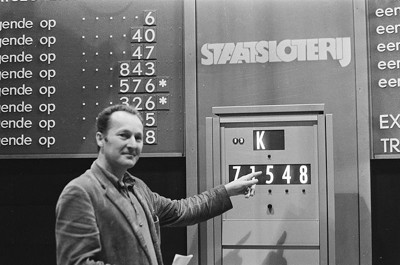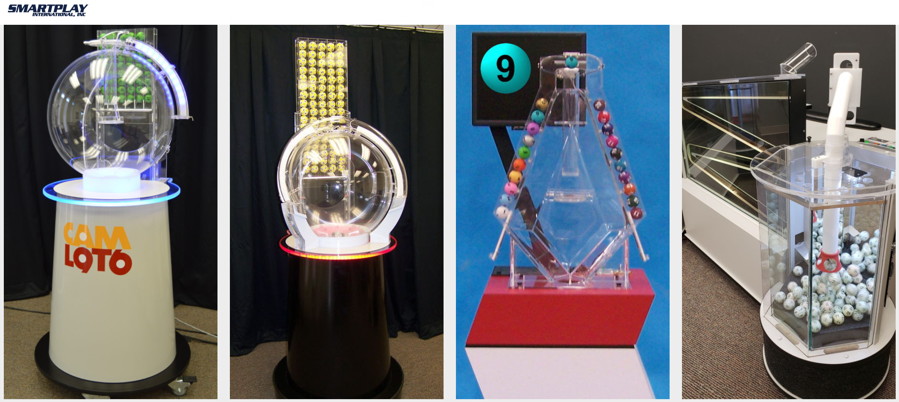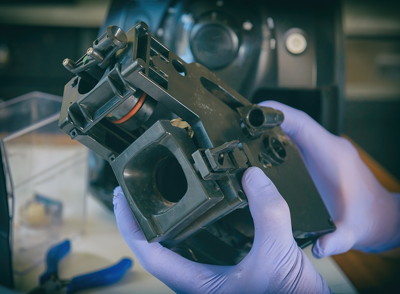 Many people think of casinos and sports bets when it comes to the world of gambling but it is key not to forget that participating in a lottery is also gambling. And of course, there needs to be processes in place for official lotteries in any country to ensure fairness and security. The UK National Lottery has been operational since 1994, and other than the inclusion of more balls and various different types of lotteries, the routine has stayed the same with drawing numbers to find the winner(s).
Many people think of casinos and sports bets when it comes to the world of gambling but it is key not to forget that participating in a lottery is also gambling. And of course, there needs to be processes in place for official lotteries in any country to ensure fairness and security. The UK National Lottery has been operational since 1994, and other than the inclusion of more balls and various different types of lotteries, the routine has stayed the same with drawing numbers to find the winner(s).
That process sees players visit a lottery stand or go to the online website to purchase their tickets. These can either have specific numbers chosen by the player or random ones selected by a random number generator (RNG). Then, the ticket needs to be held onto until the draw date. It is on that date that the lottery machine comes into play, which is where the numbered balls are held and drawn from.
The question is, who makes these lottery machines? Who is responsible for making sure they are fair, and how are they regulated by the industry? How do the machines actually work when they’re ready to draw balls out? And furthermore, have these machines ever failed/been tampered with and provided rogue results?
History of the Lottery Machine

Today’s lottery machines feature technology of the time, but in the early days, this was not something that was available. Back in the day, lotteries were done by tickets or numbers being drawn from a simple container. Of course, this method of proceeding with a lottery is very much easily opened to being rigged more so than many others. It is absolutely imperative that a draw is done in a fair way, and so as to ensure this is the case today, lottery machines can cost £50,000+ to create.
While the draw machines can come in different shapes and alternate sizes, it is usually a mechanical machine that is utilised today. These provide a see-through orb or container for anyone watching to see the balls being tossed about inside, making the game a lot more transparent. Players can see exactly how the machine is operating in front of their eyes. As things stand, there are two types of these mechanical lottery machines in operation today. They are:
Gravity Pick Machine – If you play the UK Lottery, then you will have seen this in action on television, no doubt. It is the most common type of lottery machine, featuring a drum that includes rotating paddles inside. These turn in opposite directions to toss the numbered balls around, and then the required number of balls are drawn from the drum by passing through a space at the bottom, or by being pushed up by a ram, one at a time.
Air-Mix Lottery Machine – Numbered balls are once again inserted into a large see-through orb with the air-mix machine. These balls are tossed around by jets of air that come from a fan below the orb itself. All of the balls are weighted out perfectly to ensure they are all the same size and heaviness. Winning numbers are shot up and out of the chamber through a tube at the top, rolling down into a display tray afterwards. Generally speaking, air-mix machines are utilised for smaller lottery games.
Who Makes The Machines & How Are They Regulated?

When The National Lottery began operating originally, it utilised draw machines for its Lotto and Lotto Extra games that were the Criterion model (named Arthur, Guinevere, Lancelot, and Merlin), which are manufactured by Smartplay International Inc. However, in 2003, Camelot (the brand that operates the lottery) replaced these machines with the Magnum I model, which come from the same company. Then, in 2009, these were replaced once more. New machines for the Thunderball game were introduced shortly after, taking over where Smartplay’s Halogen I model had started in 1999.
As things stand today, the machines in use for the standard lottery are from Smartplay, which are the Magnum II model. Meanwhile, the Thunderball and Set for Life draws take place via the Halogen II model from the same company. But how exactly are these machines regulated and guaranteed to provide a fair result for lottery players?
Well, as with everything in the United Kingdom, it is the Gambling Commission that is responsible for regulating the lottery side of things. This includes the machines that the balls are drawn from for each lottery game. Strict procedures are in place, as laid out by the Commission, for the hosting of a lottery. These procedures are in place to ensure that all draws are fair, completely random and 100% honest. Members from the Commission’s compliance team frequently attend lottery draws throughout the year to keep track of this.
Every draw from one of the lottery machines is totally random, with each of the numbered balls having the same chance of being drawn out. Camelot is required to carry out certain tests on the machines and the balls. This is to check for flaws in the manufacture and use of such that would result in non-randomness of results taking place.
It is also the case that the University of Hertfordshire does independent testing on the randomness of the balls being drawn. The machine and the ball set utilised for each draw are scheduled on an equal rotation basis, too.
Between each of the draws, the machines and the ball sets are kept sealed and hidden away in secure storage. Strictly limited access to these areas is in place, and the seals are always checked prior to a set of balls being used for a draw. Those balls are also tested thoroughly by the National Measurement Office, as well as by Camelot, on a regular basis.
Camelot also appoints someone as the ‘draw manager’, and this person serves to ensure that the draw runs properly and fairly every time. An independent adjudicator is also present for each draw, to ensure that proper procedures for lottery draws are followed.
How Secure Are the Lottery Machines?
 It would be common for some people to look at lottery machines and question how secure and fair they actually are. Any security expert will probably inform you that no security system can be considered 100% safe. The theory is that it’s just a matter of time before a weak spot in the system is located. Lottery machines do not deviate from this theory, either. While they do incorporate security measures to make them as secure as possible, it has been proven by some people that navigating around these security features can be done.
It would be common for some people to look at lottery machines and question how secure and fair they actually are. Any security expert will probably inform you that no security system can be considered 100% safe. The theory is that it’s just a matter of time before a weak spot in the system is located. Lottery machines do not deviate from this theory, either. While they do incorporate security measures to make them as secure as possible, it has been proven by some people that navigating around these security features can be done.
That’s why the balls are tested before every draw to ensure that they weigh the same – 80g – amount, they’re the same shape, none of them have defects that will heighten or lessen their chances of being drawn, etc. Any ball found to be outside of the regulations is swiftly discarded and replaced.
In history though, having different weighted balls has been taken advantage of once or twice. You only need to take a look at the 1980 Pennsylvania Lottery Scandal, which was given the nickname of the Triple Six Fix. This was a plot to fix the outcome of The Daily Number, which was a three-digit game featured as part of the Pennsylvania Lottery. All of the balls featured in the three lottery machines, except the ones numbered 4 and 6, were weighted. This meant that drawing was almost certain to contain a combination of those numbers. The plot was a successful one, resulting in 666 being drawn on April 24, 1980. In fact, the announcer of The Daily Number at the time, Nick Perry was the man behind the scheme, masterminding it with two of his partners in a vending machine business. Perry gained access to the machines and the balls at the WTAE studio where the lottery was hosted, allowing him to insert the rigged balls.
Following that 1980 scandal, the Pennsylvania Lottery and various other drawings began taking greater precautions in order to guard against machine rigging. Yet in 2017, another scandal came to light. Once again, this occurred in the United States of America, when Eddie Raymond Tipton made a confession to rigging a random number generator. Tipton, the former information security director for the Multi-State Lottery Association (MUSL), said that he and two others were involved in multiple cases of fraud against state lotteries. His crime went back to a December 29, 2010, drawing of the MUSL lottery game entitled Hot Lotto. At the time, a top prize of $16.5 million was advertised for the lottery, and the winning ticket was found to belong to Tipton in 2014. Not only was it illegal for him to participate in the lottery with him being an employee, but prosecutors at his trial suggested that he had rigged the draw as well.
It was also the case that the South African lottery was investigated in December 2020, when the numbers 5, 6, 7, 8, 9 and 10 were drawn from the machine. Accusations of fraud were quick to rise to the surface, with 20 people winning a share of the jackpot prize as a result of the draw. While organisers of the lottery stated that the sequence is one that is often picked, some people alleged that a scam was taking place. It is an extremely rare occurrence for so many winners to share the jackpot prize. South Africa’s National Lotteries Commission (NLC) said that it would investigate the draw after negative backlash. The investigation had little follow-up, although the South African lottery remains in a considerable state of questionability, following its COO has been suspended for a second time for potential corruption.
When Machines Break
 It’s not always the case that the lottery machines are rigged or set up by insiders to draw specific numbers, though. Sometimes they just fail to provide the proper service due to faults or other technical problems. On November 30, 1996, the lottery machine being used for the UK’s draw failed to start live on air. Drawmaster John Willan was not able to start the machine, meaning that the balls failed to drop into it and the paddles did not start rotating, either. The draw itself was delayed by 55 minutes as a result, and ended up taking place after another programme, Casualty, had concluded. Oflot launched a full enquiry into the incident afterwards, but it was noted that a safety device on Guinevere had caused the problem.
It’s not always the case that the lottery machines are rigged or set up by insiders to draw specific numbers, though. Sometimes they just fail to provide the proper service due to faults or other technical problems. On November 30, 1996, the lottery machine being used for the UK’s draw failed to start live on air. Drawmaster John Willan was not able to start the machine, meaning that the balls failed to drop into it and the paddles did not start rotating, either. The draw itself was delayed by 55 minutes as a result, and ended up taking place after another programme, Casualty, had concluded. Oflot launched a full enquiry into the incident afterwards, but it was noted that a safety device on Guinevere had caused the problem.
Several years later, on November 7, 2015, the Lotto machine also broke during a draw, failing to release all the balls into the orb. This ‘technical glitch’ ended up delaying the draw significantly enough that it wasn’t able to take place on television by the time it was solved. According to Camelot, the winning balls for that £12.9 million jackpot rollover had to be drawn later than planned, but it was noted that an independent adjudicator was present for it, as always. Yet this did lead to some players questioning how they would know whether it was a rigged draw or not if they couldn’t see it happening. Various people took to their Twitter feeds and started posting Tweets complaining about the potential rigging of the draw and not believing the ‘technical fault’ explanation.